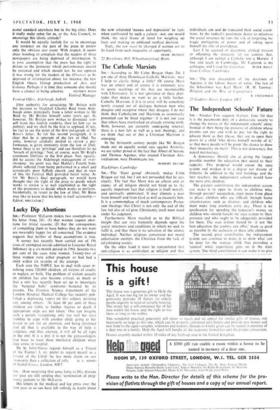Lucky Dip Abortions
SIR,—Professor McLaren makes two assumptions in his letter (June 24): (1) that women request abor tions for trivial reasons; (2) that the consequences of compelling them to have babies they do not want are invariably happy for all concerned. The evidence suggests that neither of these assumptions is true.
A survey has recently been carried out of 19S eases of attempted suicide admitted to Leicester Royal Infirmary in a six-month period in 1964. Seventy-two per cent of the cases were women. Twenty-two of these women were either pregnant or had had a child within six months of the attempt. •
Each year the NSPCC has to deal with cases in- volving some 120,000 children, all victims of cruelty or neglect, or both. The problem of violent assaults on children has also become critical, so much so that a unit has recently been set up to investigate the 'battered baby' syndrome--battered by its parents. The Forensic Science department of the London Hospital Medical College has recently pub- lished a depressing report on this subject, pointing out, among others: 'At least 60 per cent of these children are liable to further injuries or death if appropriate steps are not taken.' One can imagine such a parent, recognising only too well her total inability to cope with another child, going to her doctor to ask for an abortion, and being informed that all that is available in the way of help is sedatives, and that, anyway, it will all be all right in the end. It is a pity it is not the gynaecologists that have to treat these mutilated children when they arrive in hospital.
Mr St. John-Stevas regards himself as a 'Friend of the Foetus'; 1, sir, prefer to regard myself as a .Friend of the Child—he has more claim on our
humanity than a collection of cells. D. L. SIMMS bb: Uphill Grove, London. NW7
SIR,--1-low surprising that some forty to.fifty doctors per year are still sending their termination of preg- nancy patients to Mr McLaren.
His letters in the medical and lay press over the past year or so can have left nobody in doubt about
the now reiterated 'nausea and depression' he feels when confronted by such a patient—not, one would think, the ideal frame of mind for weighing up facts and making an unbiased medical decision. Truly, the law must be changed if women are to be freed from such inequality of opportunity. DIANE MUNDAY 22 Bre•whouse Hill, Wheathanipstead, Herts






























 Previous page
Previous page